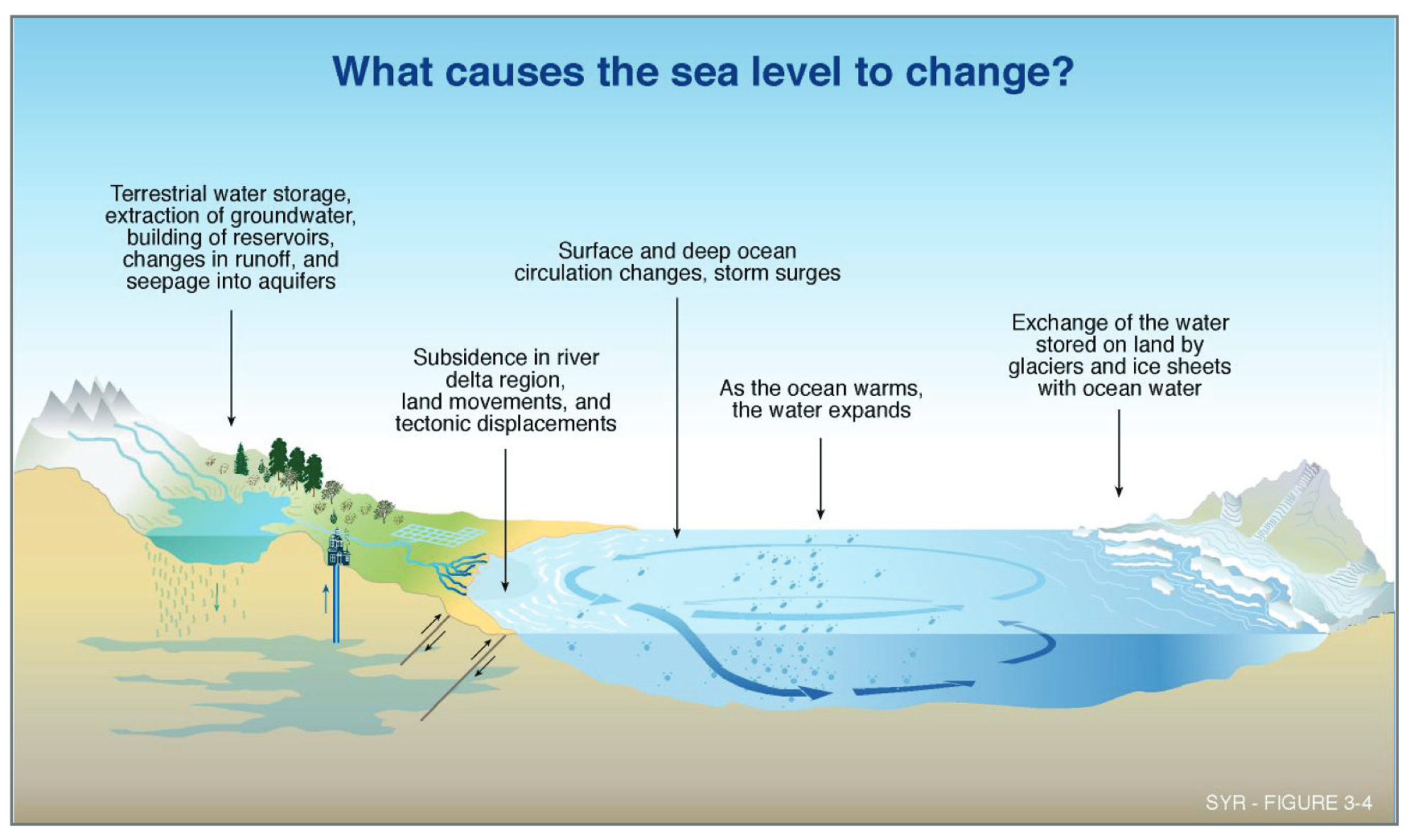Coastal Erosion And Flooding: The Impact Of Rising Sea Levels

Table of Contents
The Science Behind Rising Sea Levels
Rising sea levels are a complex issue driven by several interconnected factors, all significantly influenced by climate change. Understanding these mechanisms is key to grasping the urgency of the situation.
Thermal Expansion
As ocean temperatures rise due to increased greenhouse gas emissions, the water itself expands, leading to a significant increase in sea level. This thermal expansion accounts for a substantial portion of the observed sea level rise.
- The Intergovernmental Panel on Climate Change (IPCC) estimates that thermal expansion has contributed significantly to global sea level rise in recent decades.
- Warmer water holds less dissolved oxygen, impacting marine life and further exacerbating the consequences of rising sea levels.
- This effect is amplified by the fact that the ocean absorbs a large portion of the excess heat trapped in the atmosphere.
Melting Glaciers and Ice Sheets
The melting of glaciers and ice sheets in Greenland and Antarctica is another major contributor to rising sea levels. The rate of ice melt is accelerating, adding vast volumes of water to the oceans.
- Data from satellite observations show a dramatic increase in the rate of ice loss from Greenland and Antarctica over the past few decades.
- The massive ice sheets contain enough water to raise global sea levels by many meters if they were to melt completely.
- Positive feedback loops, such as the albedo effect (where melting ice reduces the reflectivity of the Earth's surface, leading to further warming), amplify the rate of ice melt.
Land Subsidence
In addition to the rising ocean levels, land subsidence, the sinking of land, contributes to the relative rise in sea level in certain coastal areas. This process exacerbates the effects of sea level rise, making some regions particularly vulnerable.
- Groundwater extraction is a significant cause of land subsidence, as the removal of water causes the land to compact.
- Tectonic activity can also contribute to land subsidence in certain geological regions.
- Coastal cities like Jakarta, Indonesia, and Venice, Italy, are experiencing significant land subsidence, increasing their vulnerability to flooding.
The Impacts of Coastal Erosion
Coastal erosion, driven by rising sea levels and increased storm intensity, poses a severe threat to coastal communities and ecosystems.
Loss of Land and Infrastructure
The relentless advance of the ocean is leading to a significant loss of land and damage to coastal infrastructure, including roads, buildings, and vital utilities.
- Many coastal communities are losing valuable land to erosion, leading to property damage and displacement.
- The cost of rebuilding and relocating infrastructure is substantial, placing a heavy burden on local and national economies.
- Coastal ecosystems, including beaches, dunes, and wetlands, are being severely damaged or destroyed.
Increased Vulnerability to Storms
Coastal erosion weakens natural and artificial coastal defenses, leaving communities more vulnerable to the destructive forces of storms and storm surges.
- Natural barriers like dunes and mangroves, which provide crucial protection against storm surges, are eroded and degraded by rising sea levels.
- The loss of these natural defenses increases the impact of storm surges, leading to more extensive flooding and damage.
- Examples of storms significantly exacerbated by coastal erosion are numerous, highlighting the increasing vulnerability of coastal regions.
The Impacts of Coastal Flooding
Coastal flooding, a direct consequence of rising sea levels and increased storm intensity, has far-reaching economic, social, and environmental consequences.
Damage to Property and Livelihoods
Coastal flooding causes widespread damage to property, disrupts livelihoods, and forces displacement of populations.
- Numerous flooding events have demonstrated the devastating economic impact on businesses, tourism, and agriculture.
- The loss of homes and businesses leads to significant financial hardship and social disruption for affected communities.
- The displacement of populations due to repeated flooding leads to social instability and environmental injustices.
Public Health Concerns
Coastal flooding poses significant public health risks, including waterborne diseases, exposure to hazardous materials, and mental health issues related to displacement and trauma.
- Contaminated floodwaters can spread diseases like cholera and typhoid.
- Exposure to chemicals and pollutants in floodwaters can have long-term health consequences.
- The disruption of healthcare services in flood-affected areas further exacerbates public health challenges.
Loss of Biodiversity
Coastal flooding significantly impacts coastal ecosystems and biodiversity, leading to the loss of habitats and species.
- Saltwater intrusion into freshwater ecosystems can destroy sensitive habitats.
- Many coastal species are unable to adapt quickly enough to the rapid changes caused by flooding.
- The loss of wetlands and other coastal ecosystems reduces biodiversity and diminishes the ecosystem services they provide.
Mitigation and Adaptation Strategies
Addressing the escalating challenge of coastal erosion and flooding requires a multi-pronged approach focusing on both mitigation and adaptation.
Reducing Greenhouse Gas Emissions
Reducing greenhouse gas emissions is crucial to slowing the rate of sea level rise and mitigating the long-term impacts of coastal erosion and flooding.
- International agreements like the Paris Agreement aim to reduce emissions globally.
- Individual actions, such as adopting sustainable transportation, reducing energy consumption, and supporting renewable energy, contribute to emissions reduction.
- Transitioning to a low-carbon economy is essential for long-term sustainability and coastal protection.
Coastal Protection Measures
A range of coastal protection measures can be employed to help protect coastlines from erosion and flooding.
- Seawalls and other hard engineering solutions can offer immediate protection but can have negative environmental impacts.
- Beach nourishment involves replenishing eroded beaches with sand, providing a natural buffer against waves.
- Managed retreat, involving the planned relocation of communities and infrastructure, may be necessary in some highly vulnerable areas.
Community Preparedness and Planning
Effective community preparedness and planning are crucial to minimize the impacts of coastal erosion and flooding events.
- Early warning systems can provide crucial time for evacuation and other protective measures.
- Well-developed evacuation plans and disaster relief strategies can save lives and mitigate the impact of flooding.
- Community engagement and education are essential for building resilience and preparedness.
Conclusion
The devastating consequences of coastal erosion and flooding due to rising sea levels are undeniable. Understanding the science behind this phenomenon and its multifaceted impacts is crucial for effective action. We must urgently reduce greenhouse gas emissions to slow the rate of sea level rise and invest in comprehensive adaptation strategies to protect our coastlines. Learn more about this critical issue and support initiatives aimed at mitigating the devastating impacts of coastal erosion and flooding and protecting our vulnerable coastal communities. Join the effort to safeguard our coastlines for future generations.

Featured Posts
-
 Bot Governor Search Thailand Faces Looming Tariff Issues
May 10, 2025
Bot Governor Search Thailand Faces Looming Tariff Issues
May 10, 2025 -
 150 Million The Price Of Silence Broken At Credit Suisse
May 10, 2025
150 Million The Price Of Silence Broken At Credit Suisse
May 10, 2025 -
 Perus Mining Ban 200 Million Gold Output Loss Projected
May 10, 2025
Perus Mining Ban 200 Million Gold Output Loss Projected
May 10, 2025 -
 Joanna Page Calls Out Wynne Evans Performance On Bbc Show
May 10, 2025
Joanna Page Calls Out Wynne Evans Performance On Bbc Show
May 10, 2025 -
 Nhl Playoffs Oilers Vs Kings Game 1 Prediction And Betting Analysis
May 10, 2025
Nhl Playoffs Oilers Vs Kings Game 1 Prediction And Betting Analysis
May 10, 2025
